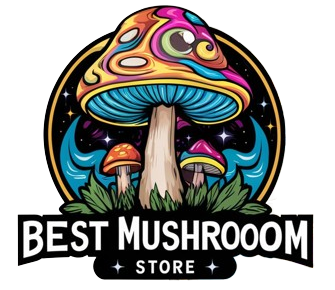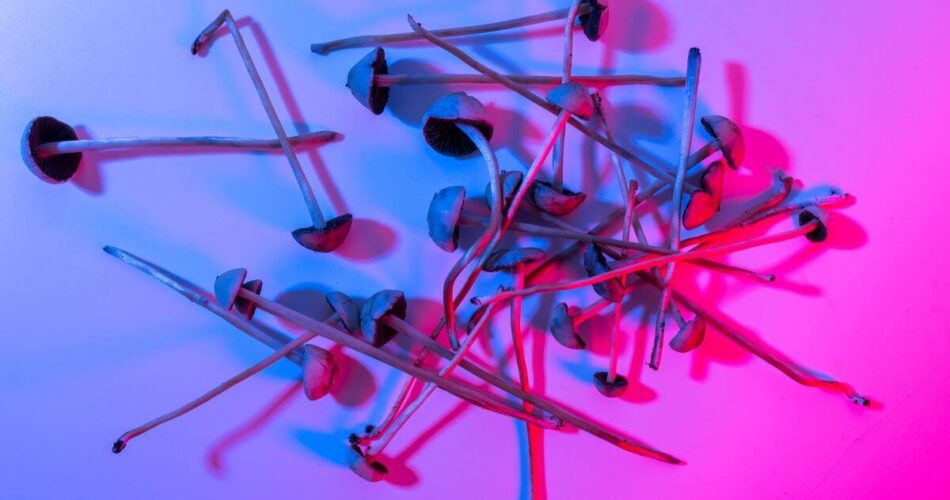We all know “magic mushrooms”, even if we don’t know exactly how do they work. They’ve been used for centuries in religious ceremonies, and now psilocybin is being studied for its potential therapeutic benefits.
What is psilocybin, though? And what does magic mushroom do to the brain? Turns out, it’s quite complex. In this post, we’ll explore the world of these hallucinogens and answer some of your questions. So, what are shrooms, and where are they come from? Read on!
What Are Magic Mushrooms?
Magic mushrooms are a type of fungi that contains psilocybin, a naturally occurring psychedelic compound. Psilocybin is thought to be responsible for the mind-altering effects of these mushrooms. When ingested, psilocybin is converted into psilocin, which interacts with serotonin receptors in the brain to produce hallucinations and alter perceptions.
History of Magic Mushrooms
The history of magic mushrooms is a long and winding one, dating back thousands of years. They are considered to be a powerful tool for spiritual growth and exploration. Psilocybin mushrooms have been used for religious ceremonies, healing practices, and recreational purposes by many cultures throughout history.
The history of magic mushrooms can be traced back to ancient times. There are references to mushrooms in Chinese, Indian, and Egyptian texts that date back thousands of years. It is believed that these cultures used mushrooms for religious ceremonies and healing rituals. They were also used in Aztec and Mayan cultures for similar purposes.
The Egyptians also used psilocybin mushrooms in religious ceremonies, and they were thought to be a powerful source of healing. In fact, the Egyptian god Osiris was often depicted holding a staff topped with a magic mushroom. The Chinese culture has a long history of using psilocybin for both religious and recreational purposes. The Chinese believed that the mushrooms allowed them to achieve spiritual enlightenment and connect with the divine.
The use of shrooms spread to other parts of the world over time, and they began to be used for a variety of purposes. In the early 1900s, for example, psychiatrists in Europe began using psilocybin to treat mental illness.
How Do Magic Mushrooms Affect Your Brain
Magic mushrooms are a type of psychedelic mushroom that contain the compound psilocybin. Psilocybin is a hallucinogen that can cause changes in perception, thinking, and emotions.
It’s thought that psilocybin affect different parts of the brain in different ways. For example, psilocybin may increase activity in some parts of the brain and decrease activity in others. This could account for the changes in thinking, perception, and emotions that are often reported after taking shrooms.
Interestingly, studies have shown that psilocybin can be effective in treating depression, anxiety, and addiction. This is thought to be because psilocybin helps to “reset” the brain in a way that allows people to experience emotions and thoughts in a new way.
Types of Magic Mushrooms
There are many types of magic mushrooms, and each one has its own unique effects. Some of the most common types include:
- Psilocybe Cubensis – this is the most well-known type of shroom, and it is usually the one that is found in outdoor settings. It has a mild effects and can induce giggling fits and hallucinations.
- Psilocybe Semilanceata – this mushroom is also known as the “liberty cap”, and it is often found in meadows and other grassy areas. It has a more intense effect than the Psilocybe Cubensis, and can cause users to feel euphoric and have out-of-body experiences.
- Panaeolus Cyanescens – this type of mushroom is found in wooded areas, and it has a more psychedelic effects than the other types. It can cause users to have deep insights and spiritual experiences.
Are Magic Mushrooms a Type of Poisonous Mushrooms?
Are magic mushrooms a type of poisonous mushrooms? This is a difficult question to answer, as there is no consensus on what constitutes a ‘magic mushroom’. Some people might say that any mushroom which can cause hallucinations is a magic mushroom, while others might restrict the term to specific species.
Regardless of how we define them, it is generally accepted that any mushrooms can be dangerous. Some species of mushrooms contain toxins which can cause serious harm, even death. For this reason, it is important to be very careful when identifying mushrooms, and to only eat those that have been positively identified by an expert.
Differences Between Magic Mushrooms and Other Psychedelic Drugs
Shrooms are one of the most popular psychedelic drugs. They contain psilocybin, a substance that can produce hallucinations and changes in perception. Other psychedelics drugs include LSD, DMT, and ayahuasca.
Overall, mushrooms containing psilocybin are a safer and less overwhelming alternative to other drugs. They are less likely to cause anxiety or paranoia, and the effects are not as long-lasting. For these reasons, shrooms are a popular choice for people who want to experience the hallucinogenic effects of drugs without taking risks.
Health Benefits of Magic Mushrooms
Psychedelic mushrooms have been used for centuries in spiritual ceremonies. Today, they are being studied for their potential health benefits. Some of the possible benefits of psilocybin include:
- reducing anxiety and depression,
- helping with addiction recovery,
- reducing symptoms of PTSD,
- enhancing creativity and cognition,
- reducing symptoms of OCD,
- helping with weight loss,
- reducing inflammation,
- treating cancer,
- boosting the immune system,
- providing spiritual insights and revelation.
Although more research is needed, the potential health benefits of psilocybin are exciting.
Johns Hopkins University – Studies on Magic Mushrooms
Johns Hopkins University has been studying the effects of magic mushrooms for years. In a recent study, they found that the active ingredient in shrooms, psilocybin, can help people with depression. In the study, participants were given psilocybin or a placebo. The participants who received psilocybin showed significant improvements in their depression symptoms.
This is not the first time that psilocybin has been shown to be beneficial for mental health. A previous study found that it could help people with anxiety.
Risks Associated with Using Magic Mushrooms
There are a number of risks associated with taking shrooms, the most serious of which is that they can cause hallucinations and psychosis. They can also cause panic attacks, anxiety, and paranoia. In some cases, they may even lead to full-blown psychosis. It’s important to be aware of these risks, especially if you have any health concerns or underlying conditions.
Other risks associated with use of psilocybin include:
- nausea,
- vomiting,
- diarrhea,
- dizziness,
- headache,
- increased heart rate,
- chest pain,
- stomach cramps,
- shakiness,
- slurred speech,
- lack of coordination.
Are Magic Mushrooms Legal?
Are magic mushrooms legal? This is a question that many people ask, and the answer is not always straightforward. Hallucinogenic mushrooms are illegal in most countries, while they are decriminalized or even legalized in others. In general, psilocybin is considered a controlled substance in most places, so it is important to check local laws before consuming them.
As of now, magic mushrooms are not legal in the United States. However, there is a growing movement to make them legal, as they have been shown to have therapeutic benefits.
Similar Posts:
- Orange Juice and Shrooms: All About Psychedelic Trips, Magic Mushrooms & Psilocybin
- Magic Mushroom Tea: Psychedelic Effects of Psilocybin. Shrooms Tea Recipe
- How to Take Shrooms? Magic Mushrooms Trip & Psilocybin Hallucinogenic Effects
- What Do Shrooms Do to Your Brain? Magic Mushrooms & How They Affect the Brain
- Are Mushrooms Legal in Amsterdam? What Are the Differences Between Magic Mushrooms and Magic Truffles?
- Magic Mushrooms Use: Can You Sleep on Shrooms? Psychedelic Drug and Psilocybin Explained
- Magic Mushrooms: How to Identify Magic Mushrooms and Types of Magic Mushrooms





